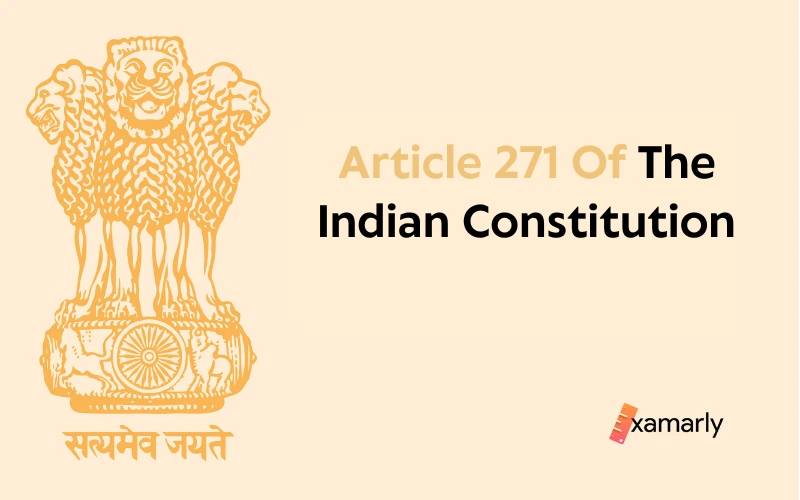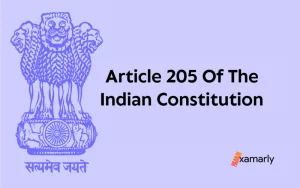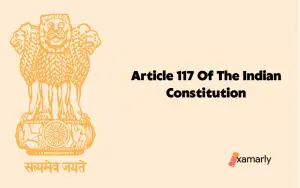In accordance with the rules of Article 271 of the Indian Constitution, the Centre may impose surcharges on specific taxes and levies. The focus of the proceedings will be brought to the Centre. The provisions of Article 271 are an exemption to those of Articles 269 and 270. The Union is also in charge of imposing and collecting the surcharge the State is not involved in either process.
It is generally outlined in Chapter I of Part XII of the Constitution how taxes are levied and how they are to be allocated or distributed between the Union and the States. Article 271 is enshrined in the forenamed Part of the Constitution.
For those preparing for the UPSC civil service exam, this page provides constitutional provisions of Article 271.
What Is Article 271 Of The Indian Constitution?
The Constitutional provision of Article 271 is as follows:
Despite the provisions of articles 269 and 270, Parliament may at any time raise any of the duties or taxes mentioned in those articles, with the exception of the goods and services tax under article 246A, by a surcharge for purposes of the Union. All proceeds from any such surcharge shall become a part of the Consolidated Fund of
India.
Relatable Article: Articles 246 And 246A Of The Indian Constitution
Explanation
According to a linguistic analysis of Article 271, the surcharge constitutes, for Union purposes, “an increase of the duties and taxes” alluded to under Articles 269 and 270. The Supreme Court has often ruled that a surcharge is a higher tax rate or administrative fee or imposition that increases the tax and that the underlying levy’s character is similar to the additional imposition. Therefore, a surcharge on income tax is also considered to be income tax, and a surcharge on estate duty is also considered to be estate duty.
Which Amendment Has Amended Article 271?
In 2016, Article 271 was changed so that the goods and services tax imposed by Article 246A would no longer fall under the purview of this particular article. This change was brought about by the 101st amendment of the Indian Constitution.
What Is A Surcharge?
A surcharge is an additional fee, charge, or tax that is tacked onto the price of a good or service after the original cost has been given.
Surcharges are frequently tacked on top of already-excised taxes. They are not reflected in the advertised price of the commodity or service.
The fee could be indicative of a government’s desire to raise money for new services, a rise to meet the cost of rising commodity prices, like a fuel levy, or a new charge on your phone bill for access to emergency services.
The surcharge can be described as a charge imposed on a tax.
Examples of a few Surcharges in India
- Those whose net income is between Rs. 50 lakh and Rs. 1 crore are subject to a 10% surcharge on their income tax bill.
- Beyond the 28% GST, a surcharge is charged for luxury and sin products.
Key components of Article 271
Key components of Article 271 include the following:
- Except for the GST indicated in Article 246A, Parliament has the authority to increase any
duty or tax at any moment by levying a surcharge. - The Consolidated Fund of India will receive all of the proceeds from the surcharges.
- The amount generated by such a tax increase must be entirely held by the parliament and is not distributed among the states.
- The Government of India Act, 1935’s Sections 137 and 136(1) serve as the foundation for this article.
- In addition, there is not a single authority that possesses the right to halt the Parliament from instituting a surcharge.
Conclusion
The Consolidated Fund of India receives the proceeds from the Union Government’s occasional decision to raise any of the taxes or charges stated in articles 269 and 270 by adding a surcharge to them, which is only done when a need arises.
FAQs
What Exactly Do You Mean By Surcharge?
Surcharges are a fee on tax that isn’t levied for any particular reason, and the Union administration is free to use the proceeds any way it sees fit. The Union Government’s surcharge and cess levies are expanding as a significant source of revenue.
What Do You Understand By Article 271?
Article 271 addresses the surcharge on certain levies and taxes for Union-related objectives.
How Would You Define Cess?
A cess is a form of tax that the government imposes on taxes for particular reasons up until the point at which the government has enough funds to complete the project. Contrary to other taxes and levies like excise and personal income tax, a cess is imposed in addition to the existing tax (tax on tax).
What Is Article 269 Of The Indian Constitution?
Article 269 of the Indian Constitution addresses the matter of how to handle taxes that are levied and collected by the Union but assigned to the States.
What Is Article 270 Of The Indian Constitution?
Article 270 of the Indian Constitution governs the imposition of taxes as well as the distribution between the Union and the states.
What Is Article 246A?
According to Article 246A of the Indian Constitution, special provisions relating to the goods and services tax are included.
Which Amendment Has Revised Article 271 Of The Constitution Of India?
With the amendment of Provision 271 in 2016, the goods and services tax levied by Article 246A is no longer covered by this particular article. This modification came about as a result of the 101st amendment that was made to the Indian Constitution.






